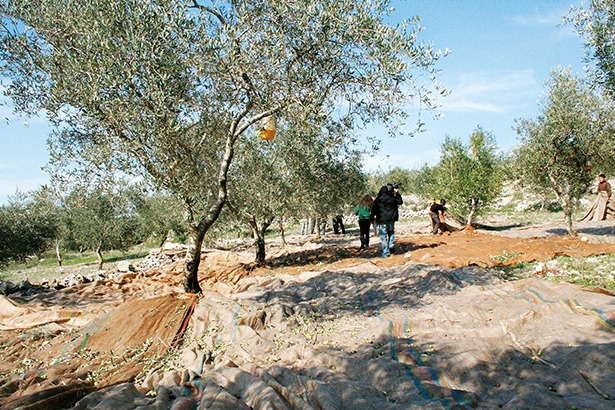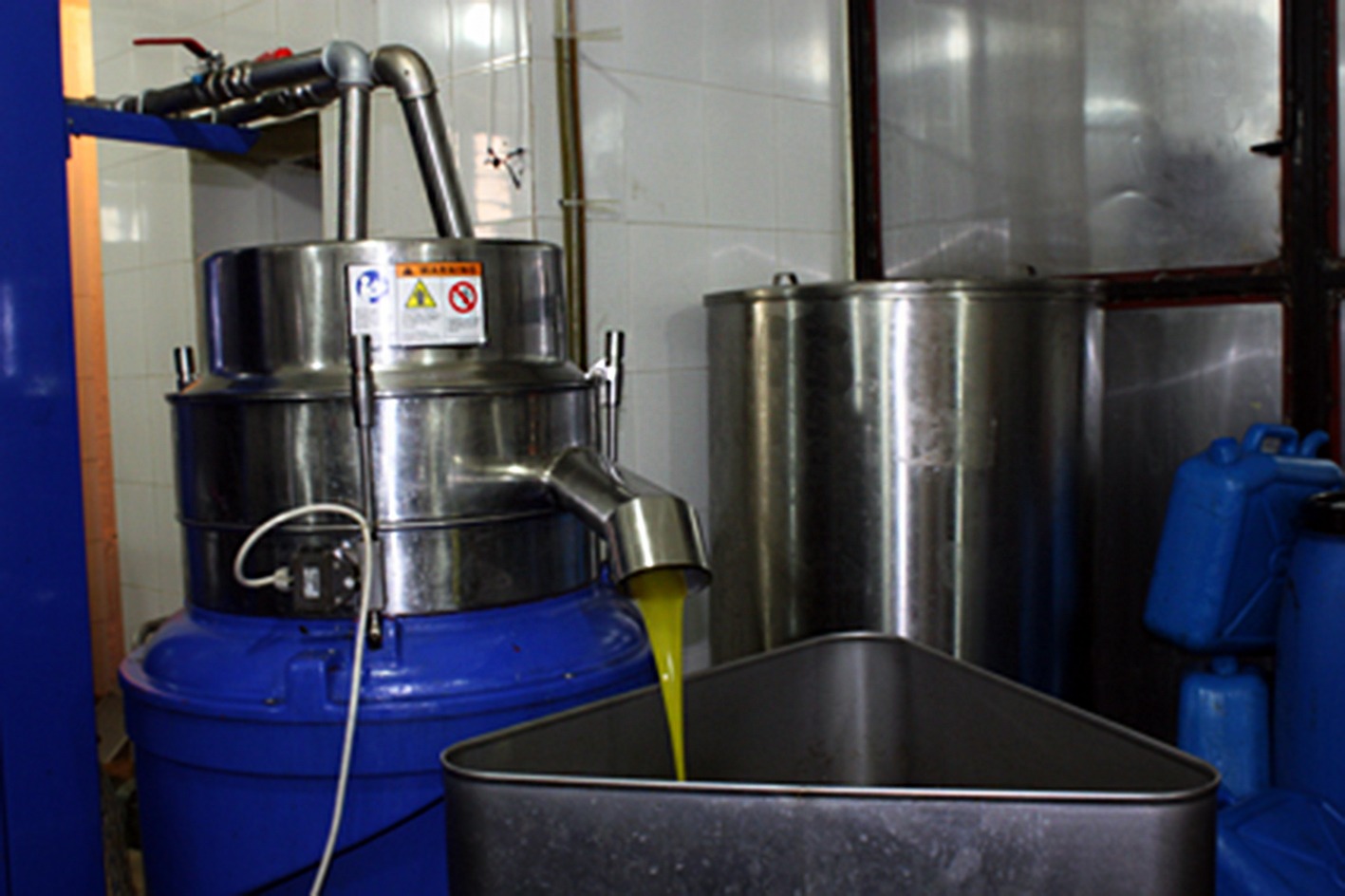Olive trees grow throughout the Mediterranean coastal region, especially on the hillsides of Lebanon’s rural landscape. Farmers take a very personal stance on the quality of the olives produced and the integrity of the oil. Taste, of course, is the best way to judge olive oil, so bear that in mind when you visit growers during harvest, sometime between October and December.
Tasting oil fresh off the press can be quite an experience, and purchasing oil directly from producers provides the added economic benefit needed by local communities. The selection of olive oil presses and producers in Akkar (a region in Lebanon’s far north where the calcareous soil best suits the Souri olive variety) featured on this tour offers visitors the opportunity to taste and purchase traditional products directly from their source. However, make sure to call ahead of time.

Mar Touma and Haddara
The Akkar olive oil trail begins in the small village of Mar Touma. Drive along the main road from the town of Tripoli towards the Akkar region. After about 28km, you will reach the crossroad of Berkayel. Continue for around 400m, then turn right at the signpost for Mar Touma, just after a petrol station. Continue for a few hundred meters until you reach the next signpost to take a right turn. As the road winds through stunning scenery, you will notice a sign after 800m, indicating the village’s first modern olive oil press completed in 2010. Here, you can stroll through the nearby olive groves and explore an underground warren of caves that were previously home to residents of Akkar, centuries ago.
Return to the same road and take a right turn to the villages of Deir Dalloum, Zouk el Moukashrine. After a short drive, you will come across a traditional olive oil press on the right hand side of the road. Farmers from across the country come to process their oil at this communal press. A short walk from here, on the same side of the road, an old stone wheel previously used for pressing, is on display. If you continue uphill to the village of Haddara, towards an elevated viewpoint at an old stone wall, the views from here stretch as far as the Mediterranean Sea and to the Syrian coastline. A one-kilometer hike off the road to the left, leads to the spring of Ain Tachde.
- Walid Haddara: +961 3 885 480
Zouk Habalsa
Drive back down to the main road and after 750 meters, turn right at the sign for Zouk Hosniyeh. Continue on in this direction towards the village of Zouk Habalsa. Here you can visit the traditional press where the owner produces organic certified oil. As you walk through the olive groves you’ll notice several beehives that produce a citrus-tasting honey that is particular to this region. The honey can be purchased from the village women’s association that specializes in molasses, rose and orange blossom water, as well as olive oil soap. Drive down to the main road and take a right turn towards the village of Harkour.
- Riad Hoblos: +961 3 325 102
Hakour
A town with a rich history, Hakour is notable for its impressive archeological sites. A Roman bridge still stands in the town, now the site of a modern mosque. A small store right on the main road specializes in preserved olives, olive oil and soap, as well as local peanuts and homemade Arak.
Behind the shop, a track leads uphill past olive trees and giant cacti plants to Tell Arqa, a Roman archeological site with incredible views of the valley. Excavations here unearthed Roman clay pots that may have been used for transporting olive oil. Return downhill and take a left turn on the main road, then take the first turn left and head towards the traditional olive oil presses. The old water mill next to the river Ariss is an interesting stop, as is the local church set on a hill with an ancient burial ground.
- Zafer Nasser: +961 3 810 300
Minyara
The next stop along the route is Minyara. Take the main road from Hakour for two kilometers. At the sign for Minyara, take a left turn off the main road to reach the local modern olive oil press. Head back to the main road to visit the traditional press. Cross the main road and head up to the local village. After 500m, you will see a small park featuring statues by local artists. Cross the road to the right to explore the rock chapel of Our Lady. Legend has it that miracles have taken place there, making it a pilgrimage site for many believers.
- Joud Berdoukian: +961 3 172 007 (traditional press)
Bkarzla
Bkarzala has had a long-standing reputation for olive oil production. From the statue park of Minyara head uphill, pass the village of Karm Asfour to reach Qantara. On the outskirts of the village you can see an ancient Roman bridge over the Oustouwan River. The road continues through expansive olive groves to reach Bkarzla, home to several traditional presses.
- Elias Saba: +961 3 271 055
- Badoui Morkos: +961 3 343 101
- Bassem and Tony Sleiman: +961 6 805 038
- Fouad Obeid: +961 3 246 274
Cheikh Taba to Zwarib
Continue your drive until you reach Halba. Turn off the main road on the right (before a supermarket). After 100m on your left, you will reach the village of Cheikh Taba, home to a traditional olive oil press that also has fine olive oil soap. Return to the village’s main road and head up the road, passing through olive groves. During harvest season you can even join in with the locals. Just ask for Marwan Nader who can arrange for this memorable experience as well as bed & breakfast accommodations with a local family. Stop to take in the breathtaking views from the Anwar mountain range down to the Mediterranean Sea.
- Elias Rassi: +961 3 474 527
Baino
Halba is the largest town en route and was the center of the region’s olive oil industry. Today, there are no functional presses. Do make a stop though for local preserves and handmade candles at the women’s association on the main road. From here, take the road to Baino, the final destination on this route. It is a picturesque drive through the premier olive growing province of Akkar, where you will see farmers harvesting. They are always welcoming and pleased to share their technique. Upon arrival in Baino, take a stroll around town to view the traditional Lebanese houses. Then, continue to the St. Theodore Church square, home to a traditional stone wheel olive oil press. Also, visit the village’s modern press where the owner has established an olive oil boutique, housed in an old stone barn.
- Dahoud Kafrouni: +961 6 360 847 (traditional press)
- Youssef Fares: +961 3 283 724 (modern press)

Take a break and pick your own olives
Celebrate the olive picking season from November till late December in Baino, Akkar, home of the “Zejd” olive and olive derivative products. For either one day or an entire weekend, handpick your olives and learn about olive oil extraction and tasting in the picturesque Baino countryside.
In the 19th century, the Fares family began cultivating olives and pressing the oil in their quaint mountain village in north Lebanon. Today, the family tradition is perpetuated with Olive Trade® through the production of quality Extra Virgin and organic olive oil.
During your stay, you can take a leisurely walk among the olive trees where you will be introduced to sustainable olive picking practices and organic farming. After visiting the olive extraction unit and familiarizing yourself with the state-of-the art extraction techniques, it’s time to taste the oil and discover its different flavors and characteristics. Savor every bite of the warm traditional Lebanese bread right out of the saj (oven) dipped into freshly pressed olive oil – an unforgettable experience!
Tel: +961 3 283 724
Producers To Look Out For
If you are on the look out to buy the best olive oil, then look no further. Below are the winners of the Horeca 2012 Extra Virgin Olive Oil Competition. Contact them for a truly unforgettable experience.
- 1st winner: Cooperative for the production and development of Olives in Dar Beshtar and Koura. Tel: +961 3 566 326
- 2nd winner: Willani. Tel: +961 3 228 849
- 3rd winner: Biomass sal. Tel: +961 3 868 882
Read more about Lebanon’s Olive Harvest here.
Article edited on November 11, 2021
Loading
